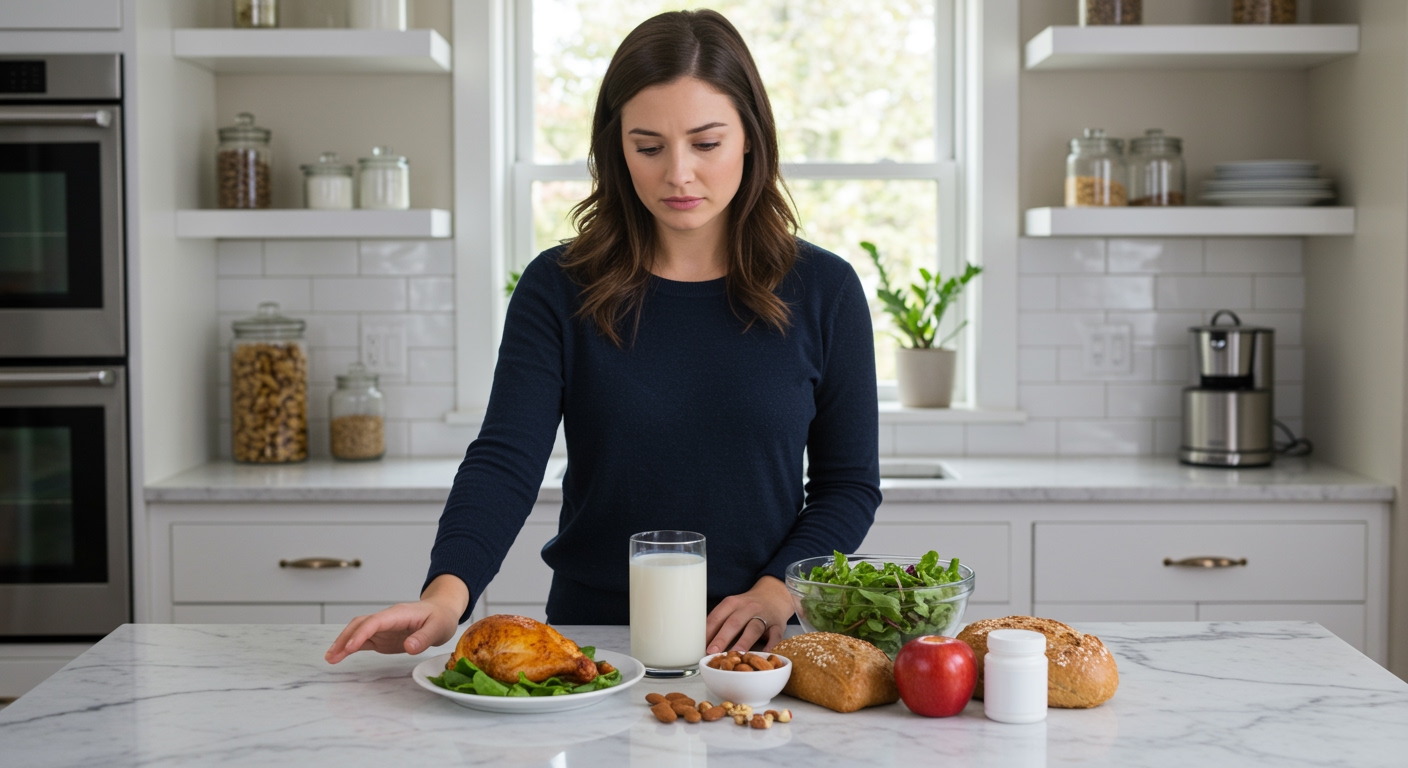✪ Key Takeaway: PCOS can cause food aversions and nausea through insulin resistance and hormonal imbalances that affect digestion.
Introduction
You wake up feeling queasy and the thought of your usual breakfast makes your stomach turn.
If you have PCOS, you might wonder whether your condition is causing these sudden food aversions and waves of nausea that seem to come from nowhere.
Hi, I’m Abdur, your nutrition coach, and today I’m going to explain how PCOS creates these uncomfortable digestive symptoms and what you can do about them.
How Does PCOS Affect Your Digestive System?
PCOS disrupts your body’s insulin sensitivity, which directly impacts how your digestive system processes food.
When insulin resistance develops, your body struggles to regulate blood sugar levels effectively after eating.
This creates a cascade of digestive problems including delayed gastric emptying, where food sits in your stomach longer than normal.
The prolonged presence of food in your stomach triggers nausea and can make certain foods feel completely unappealing.
Additionally, PCOS affects your gut microbiome composition, altering how your body responds to different foods.
Research shows that women with PCOS have different bacterial populations in their intestines compared to women without the condition.
These microbiome changes can increase inflammation in your digestive tract and create sensitivity to foods you previously enjoyed without problems.
✪ Fact: Women with PCOS are 40% more likely to experience digestive issues compared to women without the condition.
What Role Do Hormonal Imbalances Play?
The hormonal chaos characteristic of PCOS directly influences your appetite regulation and food preferences.
Elevated androgen levels can alter your sense of smell and taste, making familiar foods suddenly seem unappetizing or even repulsive.
Your body produces higher levels of cortisol due to the chronic stress that PCOS places on your system.
This stress hormone disrupts normal digestive processes and can trigger nausea, especially when combined with irregular eating patterns.
Fluctuating estrogen levels in PCOS also affect your digestive tract motility, which is how quickly food moves through your system.
When estrogen levels drop suddenly, it can slow down digestion and create feelings of fullness, bloating, and nausea.
The combination of these hormonal changes creates a perfect storm for developing food aversions that can significantly impact your nutritional intake.
✪ Pro Tip: Track your symptoms alongside your menstrual cycle to identify patterns in your food aversions.
Which Foods Commonly Trigger Aversions In PCOS?
Women with PCOS frequently develop aversions to high-fat foods like dairy products, fried foods, and fatty meats.
These foods require more energy to digest and can worsen the delayed gastric emptying already present in PCOS.
Sweet foods and refined carbohydrates often become problematic because they cause rapid blood sugar spikes followed by crashes.
Your body learns to associate these foods with the uncomfortable symptoms that follow, creating a natural aversion response.
Many women also develop sensitivity to strong-smelling foods like garlic, onions, or spicy dishes due to heightened olfactory responses.
Protein-rich foods can sometimes trigger nausea because they require significant digestive resources when your system is already compromised.
Interestingly, some women crave and then develop aversions to the same foods cyclically, reflecting the hormonal fluctuations that define PCOS.
✪ Note: Food aversions can actually be your body’s protective mechanism against foods that worsen PCOS symptoms.
How Can You Manage These Symptoms Naturally?
Start by eating smaller, more frequent meals to reduce the burden on your digestive system and minimize nausea.
This approach helps maintain stable blood sugar levels and prevents the dramatic fluctuations that trigger digestive discomfort.
Focus on easily digestible foods during episodes of nausea, such as plain rice, bananas, or clear broths.
Ginger has proven anti-nausea properties and can be consumed as tea, in cooking, or as a supplement to provide natural relief.
Stay well-hydrated but avoid drinking large amounts of fluids with meals, as this can worsen gastric distension and nausea.
Consider working with a registered dietitian who understands PCOS to develop a personalized eating plan that accommodates your food aversions.
Managing your overall PCOS symptoms through lifestyle modifications like regular exercise and stress reduction will often improve digestive symptoms as well.
✪ Pro Tip: Keep a food and symptom diary to identify your personal trigger foods and safe options.
When Should You Seek Medical Help?
Consult your healthcare provider if food aversions are preventing you from maintaining adequate nutrition or causing significant weight loss.
Persistent nausea that interferes with daily activities or lasts for more than a few weeks requires professional evaluation.
Your doctor may recommend anti-nausea medications or investigate other underlying conditions that could be contributing to your symptoms.
Blood tests can help determine if nutritional deficiencies have developed due to restricted food intake from aversions.
If you suspect pregnancy, seek immediate medical attention as PCOS can mask early pregnancy symptoms and complicate diagnosis.
A gastroenterologist might be necessary if digestive symptoms persist despite PCOS management efforts.
Remember that addressing the root cause of PCOS through comprehensive treatment often resolves associated digestive issues naturally.
✪ Fact: Early intervention for PCOS-related digestive symptoms prevents long-term nutritional complications.
The Bottom Line
PCOS can definitely cause food aversions and nausea through multiple mechanisms including insulin resistance, hormonal imbalances, and digestive system disruption.
Your body often knows what it needs better than your mind does, so listen to those aversion signals while working to address the underlying PCOS.
I would love to hear about your experiences with PCOS-related food aversions or any questions you might have about managing these challenging symptoms in the comments below.
References
At NutritionCrown, we use quality and credible sources to ensure our content is accurate and trustworthy. Below are the sources referenced in writing this article:
- PK Women’s Clinic: PCOS and Nausea: Is There a Connection?
- Cleveland Clinic: Food Aversion
- Mayo Clinic: Polycystic Ovary Syndrome (PCOS) – Symptoms and Causes
- Healthline: PCOS Diet: Foods to Eat and Avoid





